
Related
Topics
Some are calling it Latin America’s al Jazeera. This weekend, a coalition of leftist governments, media outlets and movements, led by Venezuela, officially launched Telesur–a new Latin America-wide satellite TV network. We go to Caracas to speak with Andres Izarra, Venezuela’s communications minister and president of Telesur as well as attorney Eva Golinger. [includes rush transcript]
Some are calling it Latin America’s al Jazeera. This weekend, a coalition of leftist governments, media outlets and movements, led by Venezuela, officially launched Telesur–a new Latin America-wide satellite TV network.
Just after noon on Sunday, Telesur began broadcasting a pilot service from studios in Caracas with a team of 25 journalists in nine regional bureaus presenting news “from a Latin American perspective”.
The channel’s first news program began with a critical report on the failure of the humanitarian mission in Haiti followed by a story on the plight of refugees in Colombia.
The station is being launched with help from other Latin American governments including Argentina, Cuba and Uruguay. The driving force has been Venezuelan President Hugo Chavez, whose government has contributed 70 percent of Telesur’s financing and owns 51 percent of the channel. The channel’s board members include a group of international supporters including the actor Danny Glover, the writer Tariq Ali and Nobel Peace Prize winner Adolfo Perez Esquivel.
But even before its launch, Telesur was being attacked in Washington. Last week the House passed an amendment calling for the U.S. to begin broadcasting its own channel into the region to counter Telesur. Chavez responded by saying, “we will take measures to neutralize the attempt, and what we will have is a kind of electronic warfare.”
- Andres Izarra, Minister of Communication for Venezuela and president of Telesur. He joins us on the line from Caracas.
- Eva Golinger, attorney who has represented the Venezuelan government. She is author of “The Chávez Code: Cracking U.S. Intervention in Venezuela.”
Transcript
AMY GOODMAN: We go now to Caracas to speak with Eva Golinger, an attorney based in New York, runs the website VenezuelaFOIA.info, which has been using Freedom of Information Act to obtain more information on the connection between the U.S. government and anti-Chavez opposition in Venezuela. Welcome to Democracy Now!, Eva Golinger.
EVA GOLINGER: Thank you. Good morning, Amy.
AMY GOODMAN: Very good to have you with us. Can you talk about the significance of this new Latin American TV satellite network?
EVA GOLINGER: Well, this is a project that the Venezuelan government has been working on for the past six years, so it’s amazing to finally see it come to fruition. And this effort basically since the beginning of this year, or spring, Telesur has been in motion. There was also a signal was launched in May that was basically just a trial, and it has been broadcast just about an hour a day in different Latin American countries on DirecTV satellite television and some cable channels. But now, officially the pilot channel has been launched. It will be four hours a day of broadcasting primarily on satellite cable, and in some countries they have been able to pick up on their local stations a Telesur signal.
But basically, I mean, the point of this channel is included in the entire perspective of what’s happening here in Venezuela: this Bolivarian revolution, Latin American integration, basically bringing back the voice of Latin America to the people, to being able to project and see themselves in their own eyes. And that’s really what the purpose of this station is, is to counteract the images and the politics and the media manipulation that’s coming out of stations like CNN, which is incredible, because people in Venezuela and in Brazil and in Argentina and in other South American nations see themselves through the eyes of U.S. bureaus. CNN in Spanish, which is what’s broadcast, broadcasts the news of Latin America throughout Latin America, is based in Atlanta, Georgia, and is, of course, run by CNN, which is a U.S. company. And other channels, even in Venezuela, for example, is primarily private media channels are run — the largest media owner in Venezuela is Gustavo Cisneros and his Cisneros Group of Companies, which also owns the Univision Network in —- as one of the largest shareholders of the Univision Network in the United States, and is broadcasting also a perspective that primarily is promoting U.S. interests, U.S. commercial interests primarily and, I mean, this has been an ongoing issue in Venezuela of utmost importance, which is why the Telesur is so crucial at this time, because in Venezuela they have been living through for the past six years basically, but primarily since the time of the coup in April 2002, which briefly overthrew President Chavez, an all out media war, where all private media in Venezuela are against the government, and not only are against the government, but constantly are projecting images that distort and manipulate information. So Telesur is going to be the attempt to balance out this media war, as well to engage in it in some ways by -—
AMY GOODMAN: Eva Golinger, we’re also joined on the phone by the Minister of Communication for Venezuela. Eva Golinger, a lawyer who represents Venezuela, author of The Chavez Code. And we hope we have him with us. Andres Izarra, who joins us on the line from Caracas, President of Telesur. Are you with us, Andres Izarra? We may have lost him, so we will try to get him back on the line. But continue what you were saying, Eva Golinger.
EVA GOLINGER: Well, I’d like to mention the fact that, well, the book, The Chavez Code: Cracking U.S. Intervention in Venezuela, which is my book recently published in Venezuela and waiting still to be published in the United States, although I have already signed two contracts with different publishers, and they have both backed out at the last minute. It must be due to government pressure, because the book is about the ongoing U.S. intervention in Venezuela over the past four years approximately, since basically six months or a year before the time of the coup.
And after that, we had in Venezuela after the April 2002 coup, which was, you know, a failed coup in the fact of the people came out and took back their president on April 13. Later that same year in December was a 64-daylong strike led by oil industry executives and other managers in different professions and the media, and what took place was something completely unprecedented. All private media stations gave over their broadcasting time 24 hours a day, seven days a week, to the opposition to the Venezuelan government. And they broadcast nonstop propaganda, basically distorted information and sometimes violent, aggressive images in the attempt to overthrow the government. It was really the first time to see an entire media block join in with a political force to try to overthrow a government. It failed, of course, in that attempt.
And now, we’re seeing that Telesur, before it’s even launched, the U.S. government, which already has a monopoly on information not just in Venezuela, in all of Latin America and also in the United States, in terms of what perspective people should be seeing, what type of public opinion there should be about what’s taking place in countries like Venezuela, where there is a model, a political model, being implemented that contrasts the U.S. model, the neoliberal capitalist model, and here we’re seeing last week the House of Representatives approved an amendment that was promoted by Florida Representative, Congressman Connie Mack, to authorize, not to fund, but to authorize 30 minutes a day of broadcasting transmissions into Venezuela to counteract the Telesur perspective. I mean, basically saying, 'Oh no, here's Telesur is going to come out,’ and what they called it it was anti-Americanism, and then the U.S. government therefore needs to spend our taxpayer dollars to broadcast even more transmissions and images and information into Venezuela.
AMY GOODMAN: Eva Golinger, I’m going to cut you off there, because it looks like we have been joined by Andres Izarra, and ask stations to hold on for the break for a minute so we don’t lose him. He is President of Telesur, the national TV Latin American network that was launched on Sunday, joining us on the line from Caracas. Welcome to Democracy Now!, Andres Izarra.
ANDRES IZARRA: Thank you, Amy. Good morning to you.
AMY GOODMAN: Very good to have you with us. Can you talk about the significance of this new network that you have launched?
ANDRES IZARRA: Well, this is a network that we are launching towards fomenting — pushing integration between the Latin American nations. It has a clear vision in that sense. We’re trying to have a network where we can look at our own processes, our own societies, our own culture with our own eyes nowadays to get news and information on what is going on in Argentina or Brazil or Bolivia. And through the American networks, there is an effort to try to now reach other with — within ourselves with our own eyes. Hello?
AMY GOODMAN: Yes, can you talk about the efforts by the U.S. Congress, passing legislation to launch information into Latin America to counter this international Latin American TV satellite network, Telesur?
ANDRES IZARRA: Well, we see this as an initiative from the extremists. You know, it is a very — it’s a very crazy idea to do this. I mean, first of all, you get all this U.S. networks being broadcast into Venezuela already. The biggest propaganda machine of the Bush administration, Fox News, you get 24 hours through the cable channel, so — and the own — old position controlled private networks are aligned with the U.S. messages, so we really don’t see a need to — for the money of U.S. taxpayers being used to launch another TV Marti or Radio Marti into Venezuela.
Second of all, this is not a network that’s going to be broadcasting anti-U.S. people messages. It is a network against imperialism of its expression, especially cultural imperialism. So we see this mission as an effort that’s basically going to waste U.S. taxpayers’ money. We’re not really worried about what this initiative can do to us. I mean, we will broadcast our signal, our messages, our newscast, our movies, our documentaries independently of what the U.S. tries to do against us.
AMY GOODMAN: Andres Izarra, you had your own experience in Venezuela as a reporter at the time of the attempted coup against Chavez, who you now work for. Can you talk about what happened, and why you quit?
ANDRES IZARRA: Yeah, that was during the coup in April of 2002, I couldn’t, basically because of the censorship that was imposed on the journalists who were working at this station because the station was basically trying to — well, they cut our news of what was going on and how the people reacted to Chavez when he was taken out of power. The [inaudible] manifestations and protests happened all over the country and basically there was an information blackout sponsored by the main TV stations and pretty much the whole media. They were trying to legitimatize through the media the new dictatorial regime that was imposed on Venezuela with the help of the United States.
AMY GOODMAN: Well, Andres Izarra, I want to thank you very much for being with us, Minister of Communication for Venezuela, President of Telesur, the new international Latin American satellite network that has just been launched, as well, Eva Golinger, a lawyer who has represented Venezuela, author of the book The Chavez Code.

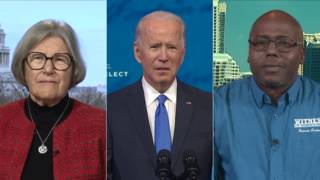
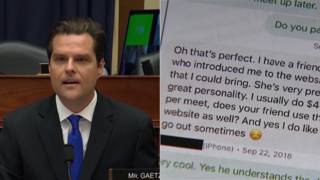
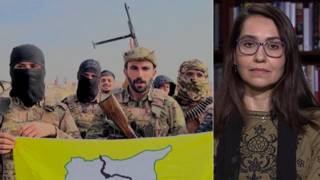
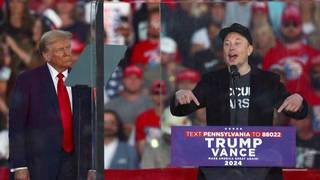





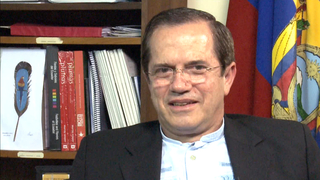
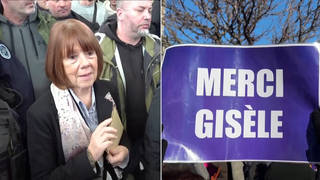
Media Options